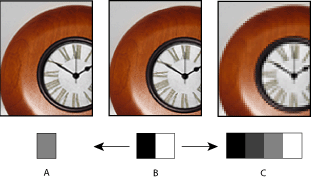About resampling
Resampling refers to changing the pixel dimensions (and therefore display size) of an image. When you downsample (or decrease the number of pixels), information is deleted from the image. When you resample up (or increase the number of pixels), new pixels are added based on color values of existing pixels. You specify an interpolation method to determine how pixels are added or deleted. (See Choosing an interpolation method.)

Keep in mind that resampling can result in poorer image quality. For example, when you resample an image to larger pixel dimensions, the image will lose some detail and sharpness. Applying the Unsharp Mask filter to a resampled image can help refocus the image's details. (See Sharpening images.)
You can avoid the need for resampling by scanning or creating the image at a high enough resolution. If you want to preview the effects of changing pixel dimensions on-screen or print proofs at different resolutions, resample a duplicate of your file.